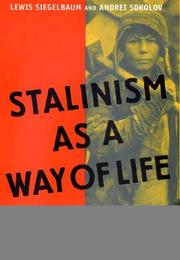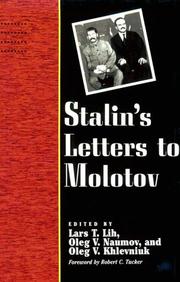| Listing 1 - 2 of 2 |
Sort by
|


ISBN: 1281721719 9786611721718 0300128592 9780300128598 9781281721716 0300084803 9780300084801 6611721711 Year: 2000 Publisher: New Haven, Conn. Yale University Press
Abstract | Keywords | Export | Availability | Bookmark
 Loading...
Loading...Choose an application
- Reference Manager
- EndNote
- RefWorks (Direct export to RefWorks)
"Maybe some people are shy about writing, but I will write the real truth. . . . Is it really possible that people at the newspaper haven't heard this. . . that we don't want to be on the kolkhoz [collective farm], we work and work, and there's nothing to eat. Really, how can we live?"-a farmer's letter, 1936, from Stalinism as a Way of Life What was life like for ordinary Russian citizens in the 1930's? How did they feel about socialism and the acts committed in its name? This unique book provides English-speaking readers with the responses of those who experienced firsthand the events of the middle-Stalinist period. The book contains 157 documents-mostly letters to authorities from Soviet citizens, but also reports compiled by the secret police and Communist Party functionaries, internal government and party memoranda, and correspondence among party officials. Selected from recently opened Soviet archives, these previously unknown documents illuminate in new ways both the complex social roots of Stalinism and the texture of daily life during a highly traumatic decade of Soviet history. Accompanied by introductory and linking commentary, the documents are organized around such themes as the impact of terror on the citizenry, the childhood experience, the countryside after collectivization, and the role of cadres that were directed to "decide everything." In their own words, peasants and workers, intellectuals and the uneducated, adults and children, men and women, Russians and people from other national groups tell their stories. Their writings reveal how individual lives influenced-and were affected by-the larger events of Soviet history.
HISTORY / Russia & the Former Soviet Union. --- Stalin, Joseph, --- Djougatchvili, Iossif Vissarionovitch, --- Джугашвили, Иосиф Виссарионович, --- Dzhugashvili, Iosif Vissarionovich, --- Koba, --- Shih-tʻai-lin, --- Sidalin, --- Ssu-ta-lin, --- Stalin, Giuseppe, --- Сталин, И. В. --- Stalin, I. V. --- Сталин, Иосиф, --- Stalin, Iosif, --- Сталин, К., --- Stalin, K., --- Staline, --- Staline, Joseph, --- Staljin, J. V., --- Sutārin, --- Soselo, --- Stalini, Ioseb Besarionis że, --- Sṭalin, Y. Ṿ., --- Sṭalin, Y., --- Stalin, Josef, --- Stalin, Josef Vissarionovich, --- סטאלין, יאסיף, --- סטאלין, י. --- סטאלין, י. וו --- סטאלין, י. װ. --- סטאלין, י., --- סטלין, יוסיף ויסאריונוביץ׳, --- סטלין, יוסף --- 斯大林, --- Stalin, Jossif Vissarionovitš, --- Sztálin, Joszif, --- Istālīn, Yūsīf Vīsāryūnūvīch, --- استالين، يوسيف ويساريونووتج, --- Soviet Union --- Советский Союз --- Ber. ha-M. --- Zwia̦zek Socjalistycznych Republik Radzieckich --- Szovjetunió --- TSRS --- Tarybų Socialistinių Respublikų Sąjunga --- SRSR --- Soi︠u︡z Radi︠a︡nsʹkykh Sot︠s︡ialistychnykh Respublik --- SSSR --- Soi︠u︡z Sovetskikh Sot︠s︡ialisticheskikh Respublik --- UdSSR --- Shūravī --- Ittiḥād-i Jamāhīr-i Ishtirākīyah-i Shūrāʼīyah --- Russia (1923- U.S.S.R.) --- Sovetskiy Soyuz --- Soyuz SSR --- Sovetskiĭ Soi︠u︡z --- Soi︠u︡z SSR --- Uni Sovjet --- Union of Soviet Socialist Republics --- USSR --- SSṚM --- Sovetakan Sotsʻialistakan Ṛespublikaneri Miutʻyun --- SSHM --- Sovetakan Sotsʻialistakan Hanrapetutʻyunneri Miutʻyun --- URSS --- Unión de Repúblicas Socialistas Soviéticas --- Berit ha-Moʻatsot --- Rusyah --- Ittiḥād al-Sūfiyītī --- Rusiyah --- Rusland --- Soṿet-Rusland --- Uni Soviet --- Union soviétique --- Zȯvlȯlt Kholboot Uls --- Związek Radziecki --- ESSD --- Sahaphāp Sōwīat --- KhSHM --- SSR Kavširi --- Russland --- SNTL --- PSRS --- Su-lien --- Sobhieṭ Ẏuniẏana --- FSSR --- Unione Sovietica --- Ittiḥād-i Shūravī --- Soviyat Yūniyan --- Russian S.F.S.R. --- History --- Związek Socjalistycznych Republik Radzieckich --- ZSRR --- Związek Socjalistycznych Republik Sowieckich --- ZSRS


ISBN: 0585349479 9780585349473 9780300174229 0300174225 0300062117 0300068611 9780300062113 0300062117 9780300063851 0300063857 Year: 1995 Publisher: New Haven Yale University Press
Abstract | Keywords | Export | Availability | Bookmark
 Loading...
Loading...Choose an application
- Reference Manager
- EndNote
- RefWorks (Direct export to RefWorks)
"It is thus important to a) fundamentally purge the Finance and Gosbank bureaucracy, despite the wails of dubious Communists like Briukhanov-Piatakov; b) definitely shoot two or three dozen wreckers from these apparaty, including several dozen common cashiers."-- J. Stalin, no earlier than 6 August 1930"Today I read the section on international affairs. It came out well. The confident, contemptuous tone with respect to the great powers, the belief in our own strength, the delicate but plain spitting in the pot of the swaggering great powers--very good. Let them eat it."--J. Stalin, January 1933 Between 1925 and 1936, a dramatic period of transformation within the Soviet Union, Josef Stalin wrote frequently to his trusted friend and political colleague Viacheslav Molotov, Politburo member, chairman of the USSR Council of Commissars, and minister of foreign affairs. In these letters, Stalin mused on political events, argued with fellow Politburo members, and issued orders. The more than 85 letters collected in this volume constitute a unique historical record of Stalins thinking--both personal and political--and throw valuable light on the way he controlled the government, plotted the overthrow of his enemies, and imagined the future. This formerly top secret correspondence, once housed in Soviet archives, is now published for the first time.The letters reveal Stalin in many different and dramatic situations: fighting against party rivals like Trotsky and Bukharin, trying to maneuver in the rapids of the Chinese revolution, negotiating with the West, insisting on the completion of all-out collectivization, and ordering the execution of scapegoats for economic failures. And they provide important and fascinating information about the Soviet Unions party-state leadership, about party politics, and about Stalin himself--as an administrator, as a Bolshevik, and as an individual. The book includes much supplementary material that places the letters in context. Russian editor Oleg V. Naumov and his associates have annotated the letters, introduced each chronological section, and added other archival documents that help explain the correspondence. American editor Lars T. Lih has provided a lengthy introduction identifying what is new in the letters and using them to draw a portrait of Stalin as leader. Lih points out how the letters help us grasp Stalins unique blend of cynicism and belief, manipulation and sincerity--a combination of qualities with catastrophic consequences for Soviet Russia and the world."The letters cast much light on how Stalin went about running the Soviet state during those years....The Stalin of the letters... was an astute and effective leader who . . . was totally devoid of the most elementary human feeling for those who fell victim to one or another of his political designs."--Robert C. Tucker, from the Foreword "The first seventy letters in the book--written between 1925 and 1930--bring out more vividly than ever before Stalins unrelenting concentration on power and the maneuvers with which he outwitted his rivals. At the same time, the frankness with which he writes to Molotov and the reliance he places on him make Stalin more credible as a human being. The remaining letters--from 1930 to 1936--show him becoming the suspicious despot of the purges. Taken together, these previously unpublished secret letters are arguably the most revealing documents from the Soviet archives yet available in the West."--Alan Bullock, author of Hitler and Stalin: Parallel Lives.Lars T. Lih is the author of Bread and Authority in Russia, 1914-1921. He is working on a study of bolshevism. Oleg V. Naumov is assistant director of the Russian Center for the Preservation and Study of Documents of Recent History in Moscow.Annals of Communism series
Heads of state --- BIOGRAPHY & AUTOBIOGRAPHY / Political. --- Heads of government --- Rulers --- State, Heads of --- Executive power --- Statesmen
| Listing 1 - 2 of 2 |
Sort by
|

 Search
Search Feedback
Feedback About UniCat
About UniCat  Help
Help News
News